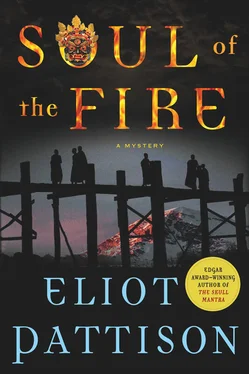Eliot Pattison - Soul of the Fire
Здесь есть возможность читать онлайн «Eliot Pattison - Soul of the Fire» весь текст электронной книги совершенно бесплатно (целиком полную версию без сокращений). В некоторых случаях можно слушать аудио, скачать через торрент в формате fb2 и присутствует краткое содержание. Год выпуска: 0101, ISBN: 0101, Издательство: St. Martin, Жанр: Полицейский детектив, на английском языке. Описание произведения, (предисловие) а так же отзывы посетителей доступны на портале библиотеки ЛибКат.
- Название:Soul of the Fire
- Автор:
- Издательство:St. Martin
- Жанр:
- Год:0101
- ISBN:9781250036476
- Рейтинг книги:4 / 5. Голосов: 1
-
Избранное:Добавить в избранное
- Отзывы:
-
Ваша оценка:
- 80
- 1
- 2
- 3
- 4
- 5
Soul of the Fire: краткое содержание, описание и аннотация
Предлагаем к чтению аннотацию, описание, краткое содержание или предисловие (зависит от того, что написал сам автор книги «Soul of the Fire»). Если вы не нашли необходимую информацию о книге — напишите в комментариях, мы постараемся отыскать её.
Soul of the Fire — читать онлайн бесплатно полную книгу (весь текст) целиком
Ниже представлен текст книги, разбитый по страницам. Система сохранения места последней прочитанной страницы, позволяет с удобством читать онлайн бесплатно книгу «Soul of the Fire», без необходимости каждый раз заново искать на чём Вы остановились. Поставьте закладку, и сможете в любой момент перейти на страницу, на которой закончили чтение.
Интервал:
Закладка:
Eliot Pattison
Soul of the Fire
CHAPTER ONE
The tear on the young nun’s cheek dripped onto the rosary in her hand. As she turned her brave, open face toward Shan Tao Yun, a shaft of sunlight burst through the port in the side of the prison wagon where they huddled, illuminating the tear like a diamond. Once, precious stones had been prized in their land for the adornment of altars and reliquaries. As Shan stared at the rosary, he realized that such tears were the new jewels of Tibet.
“Drapchi, Longtou, Chushur, Gutsa,” the old Tibetan at Shan’s side recited in a matter-of-fact tone.
Shan recognized the names of the prisons his friend Lokesh recited not because of his years as a government investigator in Beijing but due to his own years as a prisoner in Tibet. They were being transported from Lhadrung County, home of Tibet’s most infamous labor camps, toward the ring of prisons around Lhasa that were akin to medieval dungeons.
“We will have a hearing or trial or something, won’t we?” Yosen, the young nun, asked, then began patting the back of the second, older woman beside her. Pema, the grey-haired woman in the tattered felt dress of a farmer, had sat with her eyes closed for the last two hours, frantically working her prayer beads.
“There is supposed to be a chance to be heard,” Shan agreed, putting more hope in his voice than he felt. Yosen was an innocent, unfamiliar with the ruthless ways of Beijing’s Public Security Bureau.
“There will be blue papers with charges listed if they are expecting several years’ imprisonment,” Lokesh explained in the tone of an expert. “Yellow papers if it’s only an administrative detention. Yellow means no more than a year,” he added more brightly, but then cast a worried glance at Shan. The two friends could list a dozen possible charges against themselves, from sheltering political dissidents to destroying public property and concealing the Buddhist artifacts that Beijing insisted belonged to the state. Any one of those charges would send them back into the gulag for years.
“Yellow, then,” Yosen bravely said, squeezing her companion’s shoulder. “The gods will bring us yellow, Pema. We didn’t do anything. Except speak of a dead friend.”
Shan leaned toward the young woman. Yosen had said the two women were not well acquainted, that she had been pulled out of a chapel at her convent after Pema was taken from a pilgrim’s path nearby. The Public Security soldiers, the knobs, who arrested the women, had offered no explanation. “A dead friend?”
Yosen nodded and looked up as the older woman bent lower over her beads. “Before you joined us, Pema and I spoke. I asked her if she knew any reason for this-” She gestured around the rust-stained cell on wheels. “Before they took us, they asked if we knew a woman named Sonam Gyari.”
“Did this Sonam commit a crime?” Shan asked.
“Not a crime. A suicide,” Yosen replied.
Lokesh put a reassuring hand on the young nun’s shoulder. “They can’t imprison you for having a friend who died.”
Yosen shrugged. “She was my closest friend in my convent. They came last week to check our records, wanted to know if she had signed her loyalty oath. Had she recently been home with family? Had she been visited by strangers? It was the same knobs who dragged me from my prayers today.” Tears flowed down her cheeks again. “I was supposed to fill the butter lamps on the altar. What if the lamps go dark?”
Lokesh gently pulled her head into his shoulder.
Shan stood and braced himself on the steel wall to look out its small port. Since Shan and Lokesh were intercepted hours earlier at the ditch where they had been working, the wagon had been driving steadily west toward the Tibetan capital, pausing only at security checkpoints and for a brief rest stop at a truck station, where the rear door was cracked open enough for bottles of water and a bag of cold dumplings to be tossed inside.
“Six checkpoints,” Lokesh said as they pulled away from yet another police barrier across the highway. “Last time on this road, it was only three.”
The news seemed to increase Pema’s foreboding. She groaned and dropped her head into her hands. The police were getting more nervous about the purbas, the Tibetan resistance, and quicker to forcefully respond to any hint of political protest. After two generations of Chinese occupation, Tibetans still refused to be broken.
“They came and demanded oaths of loyalty to Beijing last fall,” the young nun said in a tight voice. “I was away on retreat and sent mine in two weeks late. The party member who manages the convent chastised me, said such a delay could be taken as unpatriotic. I missed two lectures on the duties of citizens given by those Religious Affairs officers. I hear there are quotas now for arresting disloyal monks and nuns. If they decide to call me a traitor, I could be put away for ten or fifteen years.” She too was considering her sins against the state. It was futile, Shan was tempted to tell her, for Beijing was constantly defining new sins for people like her. It hated anyone who even hinted that Tibetans were not Chinese, but most of all it despised those who wore the maroon robes, for it was the monks and nuns who kept the people rooted in Tibetan tradition.
“I visited your convent once,” Lokesh suddenly declared to Yosen in a whimsical tone. “It was 1956, and I traveled with the Dalai Lama, who was just a boy then. He was quite taken with the flock of white goats kept by the abbess.”
Both women looked up with round, wondering eyes, and for the next hour the old Tibetan drew them away from their despair with tales of the joyful oasis the convent had been before the Chinese occupation.
Shan marveled at his friend’s comforting words, spoken with no trace of the fear they both felt. They well knew the ways of Public Security, had suffered its wrath frequently, but had always been able to avoid new prison terms. Today their luck had run out, for they were being driven away from Lhadrung County and the protection of its governor, Colonel Tan. By nightfall, Shan would be listening to his charges, then pleading for a chance to send a note to his son, Ko, himself in a Lhadrung prison. Already he was forming the words of his letter in his mind: I will find you, Ko. No matter where they send me I will find a way to return. Listen to the lamas. Ko would know he meant listen to the lamas instead of the guards. That was how Shan had survived his own five years in the gulag.
His companions were sleeping when the truck slowed for another checkpoint before entering what appeared to be a tunnel. Suddenly it stopped, reversed, and its engine died. The rear doors were unlocked and thrown open to reveal six knobs on a loading dock, leveling automatic rifles at them. An officer stepped forward and motioned Shan out. He ignored the officer and turned toward his companions, shaking each awake, calming the women as they saw the weapons.
“You will be processed first,” he whispered in warning. “Do not resist, do not argue, but do not admit to anything and do not sign anything.” He did not have the heart to tell them how first their rosaries, then their traditional clothes would be torn from them, how they would be hosed down with frigid water, then stinging disinfectant before being separated and processed into work units. Pema hastily bent over her beads, then Yosen took her hand and led the older woman into the aisle formed by the guards, leading to another prison wagon. Lokesh seemed unaware of the knobs. He was staring in confusion at the place where the women had huddled. Pema hadn’t been reciting one last desperate mantra; she had been sketching a pattern in water on the side of the truck.
Читать дальшеИнтервал:
Закладка:
Похожие книги на «Soul of the Fire»
Представляем Вашему вниманию похожие книги на «Soul of the Fire» списком для выбора. Мы отобрали схожую по названию и смыслу литературу в надежде предоставить читателям больше вариантов отыскать новые, интересные, ещё непрочитанные произведения.
Обсуждение, отзывы о книге «Soul of the Fire» и просто собственные мнения читателей. Оставьте ваши комментарии, напишите, что Вы думаете о произведении, его смысле или главных героях. Укажите что конкретно понравилось, а что нет, и почему Вы так считаете.












